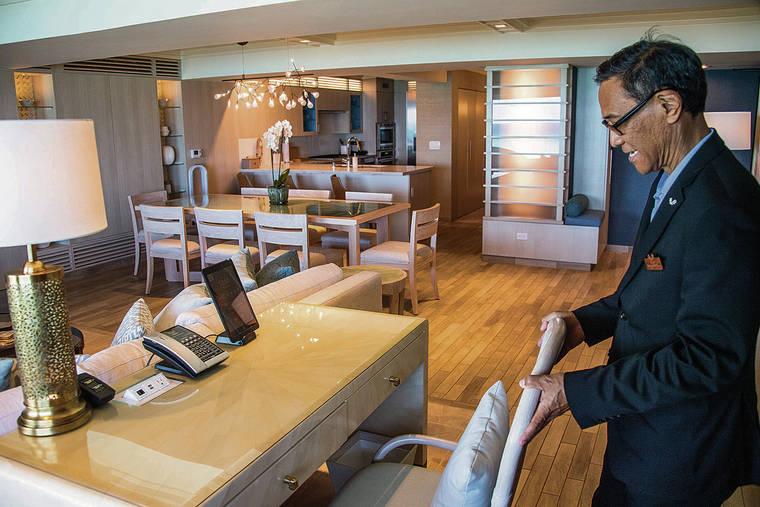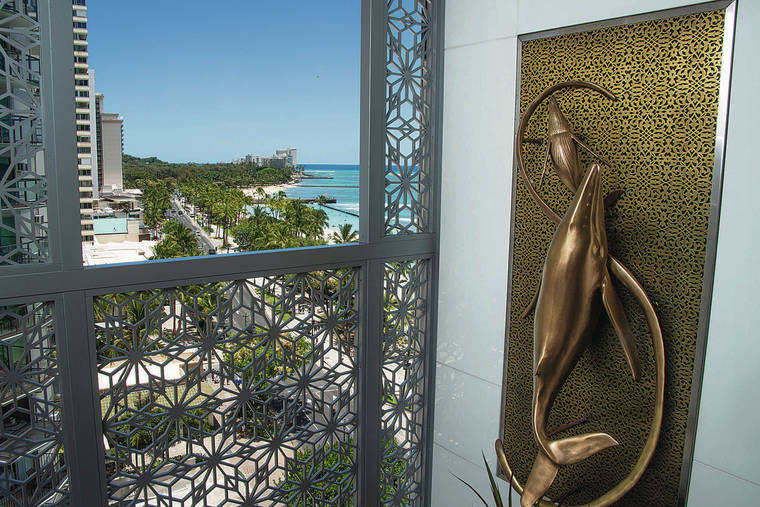Maui Mayor Mike Victorino wants tourism pause

CRAIG T. KOJIMA / CKOJIMA@STARADVERTISER.COM
Espacio, the Jewel of Waikiki, is an all-suite hotel that reopened June 1, just in time to take advantage of Hawaii’s vaccination exemption for domestic travelers and a summer swell of visitors. Hotel manager Vernon Hulihee gave a tour of the hotel Tuesday.

CRAIG T. KOJIMA / CKOJIMA@STARADVERTISER.COM
Espacio, the Jewel of Waikiki, is an all-suite hotel that reopened June 1, just in time to take advantage of Hawaii’s vaccination exemption for domestic travelers and a summer swell of visitors.


Calls for managed tourism are rising across the state as Hawaii’s visitor industry moves into summer at a pace that is approaching or in some cases surpassing 2019 levels.
Hawaii’s airports screened some 26,631 visitors Monday, with more traffic expected as Hawaii moves into the Fourth of July holiday and eases travel restrictions for fully vaccinated domestic travelers July 8.
Residents are taking to the skies also to satisfy pent-up demand for travel following more than a year of pandemic restrictions. Hawaii’s airports screened more than 30,000 passengers every day for the week ended June 22.
Maui Mayor Mike Victorino said Tuesday at a news conference that he wants “a pause.”
“We don’t have the authority to say stop, but we’re asking the powers that be to help us,” Victorino said. “We need to make some kind of result to slow them down. I want to remind the visitors that Maui is a community first and a vacation destination second.”
Victorino said he has been meeting with airline executives to determine their willingness to voluntarily reduce airlift into Kahului Airport. Some 243,702 seats came into Maui in May — a 6% increase over the 229,284 seats that were offered in May 2019.
Don't miss out on what's happening!
Stay in touch with breaking news, as it happens, conveniently in your email inbox. It's FREE!
“I’ve talked to a number of airlines. Many of them were very understanding, ” he said. “A few of them thought that airlift was not something we should be discussing.”
Hawaiian Airlines spokesman Alex Da Silva said in a statement that the carrier looked forward to continuing to work with Victorino and other leaders to find solutions to challenges affecting Hawaii’s airports and communities.
“As Hawaii’s hometown airline, we both live and work here and are conscious of the strain on our infrastructure, natural resources and communities posed by a rebound in visitor arrivals, especially when businesses still face operational restrictions associated with COVID-19,” Da Silva said. “But we know that visitors are also the engine of our economic recovery and future diversification.”
Victorino said Tuesday that he recently met with state officials to discuss gate congestion at Kahului Airport, which he said is over capacity.
Da Silva said Hawaiian is aware of capacity constraints at Kahului Airport and regularly meets with the state and TSA to discuss ways to improve the day-of-travel experience for residents and visitors.
In 2019, Hawaiian completed a multimillion-dollar renovation and redesign of its lobbies to include additional and faster check-in kiosks in the Kahului, Honolulu, Lihue, Hilo and Kona airports.
Victorino said “people are choosing to come to Hawaii not only because of its wonderful resources and people, but because there really isn’t a lot of choices.”
“It’s not my problem. It’s not just my county’s problem. It’s a state problem,” he said.
Victorino said he wants to mitigate tourism impacts on his island like traffic congestion and illegal parking. He said he has put up more signs in hot spots like Hana Highway, where enforcing parking violations has strained police resources.
Victorino said he is considering suggestions ranging from implementing visitor impact fees, if that’s determined to be legal, to closing some county parks once a week to give staff time to clean and maintain them.
Victorino’s remarks followed a report from the Hawaii Tourism Authority that visitor arrivals and spending in May were just 20% below the same month in 2019, which was a record year.
In May the state welcomed 629,681 visitors, who spent $1.10 billion, according to statistics released Tuesday by the HTA. Last month’s arrivals were about 26% down from the 847,396 visitors who came to Hawaii in May 2019, and their spending was 22% below the $1.41 billion that was generated in May 2019.
Some 418,956 visitors came from the U.S. West, or 8% more than came in May 2019. Some 193,501 visitors came from the U.S. East, which was down about 3% from May 2019.
But the international market still has far to go. Only 2,733 international visitors came to Hawaii in May.
Lagging international arrivals contributed to performance variations across the islands. Maui and Hawaii island, which are most reliant on North American visitors, exceeded May 2019 visitor spending levels and came close to the average daily visitor census.
Statewide tourism isn’t completely back to 2019 levels, but to some it might seem like it has returned. A reason is that the current level is a turnaround from the pandemic plunge when Hawaii’s visitor industry was almost completely shut down.
Capacity constraints and shortages in supplies and workers have caused some hot spots to feel greater strain even from fewer tourists.
The situation has left some residents and some visitors wanting. The percentage of residents who feel that tourism has brought more benefits than problems was at 53% in the 2021 HTA Resident Sentiment Survey, which was at its lowest level ever.
Hawaii Lodging and Tourism Association President and CEO Mufi Hannemann said now is not the time to ask airlines or visitors to skip Hawaii, which is still recovering from the pandemic lows.
“I’d rather be dealing with the kind of problems that we are facing as opposed to shut down with no hope in sight and a lot of hungry and homeless people,” he said. “We need to move forward. Shutting down is not the way to do it. We just have to learn to manage it better.”
On Kauai officials want to study parking lots at crowded beach parks and explore the possibility of imposing fees on tourists’ vehicles.
Kauai has allocated $30,000 of the county’s federal coronavirus relief money to study parking at Poipu, Lydgate and Hanalei’s Black Pot beach parks, The Garden Island reported Monday.
Espacio, the Jewel of Waikiki, which reopened June 1, has focused new offerings on an authentic and regenerative visitor experience, said Theresa van Greunen, Aqua-Aston Hospitality spokeswoman.
“We are currently partnering with Shiseido to provide reef-safe sunscreen to our guests. We also recently formed a partnership with Iolani Palace to provide our guests with a behind-the-scenes tour and opportunity to learn about Hawaii’s history and culture,” van Greunen said. “We also provide our guests with complimentary access to the Bishop Museum and the Honolulu Museum of Art — making it easier to access a rich, cultural experience and educational opportunities.”
The luxury hotel, which offers guests suites with daily rates ranging from $4,000 to $11,000, strives to educate guests about Hawaii’s challenges, while ensuring that they have a five-star stay.
“Communication with guests on what to expect and how to plan in advance are key, and flexibility for reservation changes is also now an expectation rather than a plus,” van Greunen said.
———
The Associated Press contributed to this report.





